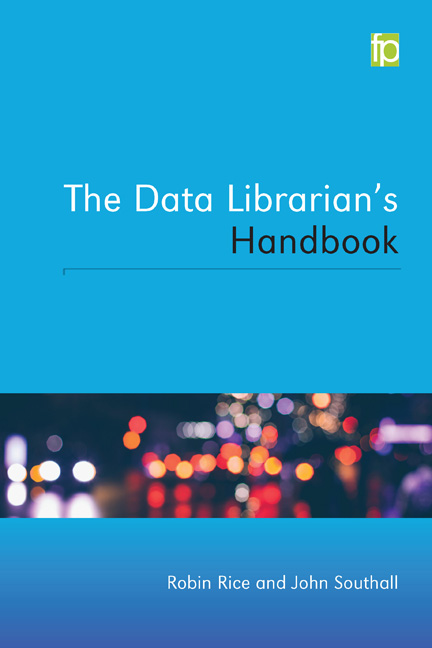Book contents
- Frontmatter
- Contents
- Acknowledgements
- Preface
- 1 Data librarianship: responding to research innovation
- 2 What is different about data?
- 3 Supporting data literacy
- 4 Building a data collection
- 5 Research data management service and policy: working across your institution
- 6 Data management plans as a calling card
- 7 Essentials of data repositories
- 8 Dealing with sensitive data
- 9 Data sharing in the disciplines
- 10 Supporting open scholarship and open science
- References
- Index
3 - Supporting data literacy
Published online by Cambridge University Press: 08 June 2018
- Frontmatter
- Contents
- Acknowledgements
- Preface
- 1 Data librarianship: responding to research innovation
- 2 What is different about data?
- 3 Supporting data literacy
- 4 Building a data collection
- 5 Research data management service and policy: working across your institution
- 6 Data management plans as a calling card
- 7 Essentials of data repositories
- 8 Dealing with sensitive data
- 9 Data sharing in the disciplines
- 10 Supporting open scholarship and open science
- References
- Index
Summary
Information literacy with data awareness
Academic librarians have excelled in promoting the information literacy agenda and developing bibliographic instruction as part of learning research skills. Not only is it quite common for library sessions to be a key part of new student inductions, but examples abound of successful partnerships with university instructors for getting library-based training into the classroom and coursework, and sometimes even assessed. Virtual learning environ - ments, online courses and distance learning all offer new ways for librarians to interact with learners and teachers as well. A little bit of ‘data awareness’ can go a long way in extending traditional information literacy and bibliographic instruction programmes.
In some ways existing forms of library instruction lend themselves easily to the addition of concepts of data management and re-use. For example, in teaching about doing a literature search in a given discipline, librarians may give instruction in using standalone or online reference management tools, such as EndNote, Reference Manager, Zotero or Mendeley. For some disciplines in which the data used are mostly in textual form (e.g. law, history), such tools may even be the best method of conducting data management throughout a research project. For disciplines using other data types, further organizing options may need to be explored, such as those described in the Research Data MANTRA training course Organising Data (HYPERLINK “http://datalib.edina.ac.uk/mantra/organisingdata”).
Bibliographic search methods may also be useful for teaching skills in data discovery. Students will not find all of the references needed for a literature search solely by consulting Google or Wikipedia, nor will they find all the supporting non-textual data for their research that way. Data librarians can teach the use of specialized data portals, disciplinary data centres, government statistical websites and repository registries alongside the use of specialized publication databases to aid discovery of published literature and data. Besides, in the case of many online databases, licensed products, or datasets requiring permission to access, content cannot be indexed by Google, and so familiarity with potential sources is essential. Training in data sources may be offered to particular classes or as part of information skills programmes. Alternatively web-based resources may be offered, for example the Bodleian Data Library web pages (www.bodleian.ox.ac.uk/data).
- Type
- Chapter
- Information
- The Data Librarian's Handbook , pp. 35 - 52Publisher: FacetPrint publication year: 2016



